All posts by webadmin
READ DAILY PUNJAB RELATED PRE-ELECTION NEWS :VOICE OF EX-SERVICEMEN PUNJAB
PoK refugees hail PM’s statement
Jammu, August 13
Reacting to the all-party meeting on Kashmir held in Delhi on Friday, Gurdev Singh, president, Jammu Kashmir Sharnarthi Action Committee, welcomed the statement of the Prime Minister and unanimously supported by all parties in the meeting to declare Pakistan-occupied Kashmir (PoK) as the fourth region of J&K.In a statement issued here today, Gurdev Singh urged upon the Centre to transform these assertions into a reality to finish the Kashmir dispute. He said the displaced persons from PoK were the worst sufferers and victims of the dispute between India and Pakistan. — TNS
Army holds medical camp in Tral
Tribune News Service
Srinagar, August 13
The Army organised a medical camp for local residents in south Kashmir’s Tral.A defence spokesman said the medical camp was organised at Kahlil village, 5 km from Tral town.“In a collaborative effort with the civil administration, a team of Army and civil doctors provided quality medical treatment to the poor and needy persons of Kahlil and nearby villages of the Tral area. Many patients were also referred to SDH, Tral, for further specialised treatment. They were also educated about various diseases, basic health, hygiene, sanitation and drug abuse,” the spokesman said.
Lt Gen Chand visits Hisar cantonment
HISAR: Lt Gen Sarath Chand, general officer commanding in chief, Sapta Shakti Command, visited the army cantonment here on Saturday. The army commander complimented the division on the professionalism exhibited during the recent exercises—Shatrujeet and Meghprahar. During the visit, the army commander interacted with officers, junior commissioned officers and other ranks and sensitised them on the security related issues. The officer stressed on operational readiness, mental robustness and directive style of command.
Army organises weapons and band exhibition in Kapurthala
KAPURTHALA: As part of Independence Day celebrations, the Ghurki Brigade, under the aegis of Goldren Arrow Division, exhibited a wide array of weapons and equipment at the Kapurthala military station on Saturday. Deputy commissioner Jaskiran Singh inaugurated he function at the Army Public School here.
HT PHOTODeputy commissioner Jaskiran Singh and SSP Rajinder Singh with army officials during an exhibition of weapons in Kapurthala on Saturday
The event was aimed at exhibiting military capabilities of the elite arm to visitors.
Army officials said tanks, guns and other weaponry were put on display.
The show received an overwhelming response from the civilians, especially youths and students.
Visitors were enthralled by the impressive display by the army bands conducted by the units of the station.
Deputy commissioner Jaskiran Singh, with senior superintendent of police, Rajinder Singh, visited the venue and army officials informed them about displayed weapons and their use.
The DC thanked Brigadier Rajesh Panicker, station commander, Kapurthala military station, for organizing the event, which helped in strengthening the bond between locals and the army.
XI Corps’ initiatives for veteran fraternity
THE STEPS TAKEN BY GENERAL JS CHEEMA AND HIS FORMATION, XI CORPS, TO RESOLVE VETERANS’ PROBLEMS ARE INDEED GROUND-BREAKING
From page 1 I’ve always thought that serving personnel are best suited to serve the cause of veterans. Apart from in-depth knowledge of their requirements there’s also deep empathy for their former comrades. Punjab’s bulwark, XI Corps has done sterling work in this regard. Under Adhikar exservicemen project were helped to realise their pension arrears in 2006 after bottlenecks had been singled out and remedial action taken. Communication, stimulus and appreciation aided in achieving objectives. I was impressed by two innovative ideas. The efficiency of pension disbursing offices was increased by refining their operating milieu and reaching out to them through seminars. Instead of lamenting the inefficiency of bank clerks in calculating arrears the trouble was taken to suitably train them. Individual pension variances of 1,107 pensioners amounting to `88.6 crore were resolved.
PHOTO: XI CORPSTriple Olympian and war hero Colonel Haripal Kaushik, VrC, being honoured by General JS Cheema, GOC, XI Corps, on the occasion of the Sikh Regimental Centre’s biennial reunion at Jalandhar on August 6.
Similar novel efforts have been made by XI Corps in respect of the arrears of OROP and the 6th Pay Commission. The results are there for all to see. A total of `508.61 crore has been disbursed by various disbursing offices and banks in clearance of the backlog to 3,11,007 veterans, war widows and veterans’ widows in the last four months. Under Sahuliyat project, placement nodes at Jalandhar and Ludhiana have provided employment to 1,276 entitled persons including 35 widows in the last two years. Special widows’ conclaves with a total presence of 1,026 women were held during this period in Amritsar, Ferozepur and Jagraon. Relevant authorities were in attendance resulting in resolution of 524 cases relating to family pensions. I can go on and on in similar vein. As General JS Cheema, commanding XI Corps moves to his new assignment overseeing the development and modernisation of infantry (he’s from the Sikh regiment) he’ll have the satisfaction of having done some path-breaking work to ameliorate veterans’ condition. Efforts have achieved real results.
SRC HOCKEY TEAM REUNION
The Sikh Regimental Centre has been one of the most significant teams in Indian hockey. To take only one decade, 1970-80 of it’s over sixty-five year history; it had during this period won no less than 54 national tournaments, been runner-up in 62 and in others mostly reached the semi-finals. The Nehru Gold Cup, Delhi 1973, 1976, Beighton Cup, Calcutta 1972, 1974, Murugappa Gold Cup, Chennai 1974, and 1976 are just some of the championships won by the team. The veterans of the SRC mostly settled in Punjab get together biennially to relive heady memories of their playing days and inspire the current team.
On August 6, the SRC veterans met at Jalandhar. The event started with the honouring of undoubtedly their greatest player, Colonel Haripal Kaushik. He played the 1956, 1960 and 1964 Olympics as the Indian centre-forward. In between his resolute defence of Tongpeng La against the Chinese won him the Vir Chakra in 1962. Present were Modan Singh, passing whose indomitable defence wasn’t a piece of cake for even the most aggressive forward and Brigadier Harinder Chimni, centre-forward of the 1975 World Cup winning team. WESTERN COMMAND GETS NEW CoS
General Iqroop Ghumman is the new chief of staff at headquarters Western Command. A June 1981 NDA/IMA graduate the general served with 17 guards, at that time an anti-tank battalion equipped with the Milan anti-tank guided missile (now a tracked reconnaissance unit).
Please write in with your narratives of war and soldiering to msbajwa@gmail.com or
call on 093161-3534
Foot march launched to protest bias against junior Army officers
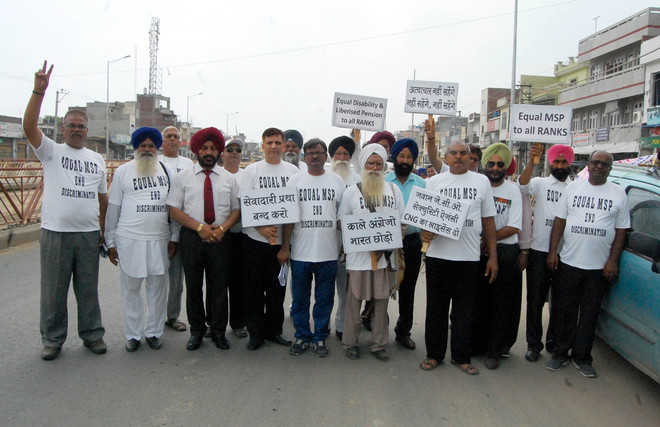
Activists of the Voice of Ex-servicemen Society carry out a foot march in Amritsar on Tuesday. PHOTO: RK SONI
Tribune News Service
Amritsar, August 9
In order to raise voice against the ‘exploitation’ and ‘discrimination’ with Junior Commissioned Officers (JCOs) and Non Commissioned Officers (NCOs) at the hands of their senior officers in the Army, the Voice of Ex-servicemen Society started a foot march from Amritsar here today, which will culminate at Jantar-Mantar in New Delhi.Members of the society started the march from Gateway of India at Attari, paid obeisance at the Golden Temple and also paid tributes at the Jallianwala Bagh during the foot march. BK Jha, national spokesperson of the society, said they would pass through various areas in Punjab and Haryana and culminate the march at Jantar-Mantar on August 25. He said the main motive behind this foot march was to raise the issue of discrimination and exploitation of low- rank officers in the Army, which was considered as a disciplined force.“Officers in the Army still suffer with colonial mindset as they force low-rank officers to polish their shoes, take their pet dogs for walks or made to do other household works,” Jha alleged. He said after retirement, the JCOs, NCOs and other officers faced discrimination and rude behaviour in canteens, sainik rest houses and sainik welfare offices.He alleged that there was discrimination while allotting gas agencies, CNG pumps, petrol pumps, etc, after retirement as a part of officers’ rehabilitation programme.Veer Bahadur Singh, president of the society, said after the third pay commission, the pension of 97 per cent jawans and JCOs was reduced from 75 per cent to 50 per cent on the pretext of poor economic conditions and now, on the OROP issue, they were completely ignored by the government as well as those so called leaders who ‘fought’ for it.
Air Force now flying civilian passengers in Andaman & Nicobar
File photo for representation only.
Kolkata, August 7
The Indian Air Force has now started flying civilian passengers twice a week in the remote Andaman and Nicobar islands.A Dornier 228 aircraft, flown by a crew of the Air Force, connects Port Blair with Car Nicobar and Campbell Bay—the two islands which lie further south in the archipelago.Meant solely for use of defence forces, IAF aircraft fly civilians only during cases of emergency, but this is an exception.At present, aerial transport in the form of Pawan Hans helicopters is available to very few islanders in Campbell Bay.Lt General A K Singh (Retd), Lt Governor of the union territory, said an extended Air India flight to Car Nicobar was withdrawn recently as the lease of the aircraft had expired after which they approached the Ministry of Defence and Ministry of Civil Aviation to improve inter-island connectivity.“The Defence ministry has now given us the aircraft for civilian use. We are collecting the airfare from passengers and paying the air force some charges based on the number of flying hours. Our tickets are subsidised for islanders,” he told PTI from Port Blair.The twin engine turbo-prop aircraft which can cruise at a speed of 200 knots can carry up to ten passengers.Fitted with modern avionics, the aircraft is widely used for transport of air force personnel.“The new aircraft is for the people but run by the administration of the union territory as it is they who do the bookings,” said Colonel Yogesh Sharma of the tri-service Andaman and Nicobar Command.Sharma said by providing a much faster transportation alternative to the islanders it will add a new dimension to passenger traffic network in the Bay of Bengal islands.The IAF Dornier takes one hour from Port Blair to reach Car Nicobar Island from where Campbell Bay is another hour away.The entire journey is about 300 km.The air force has been working closely with the local administration on disaster management for a long time. Every year they receive multiple requests for evacuation of civilians during severe medical emergencies.All airbases, airstrips and helipads in the chain of islands are under the control of the defence.In the absence of adequate transport network, the new flight service has got an enthusiastic response from locals.The Lt Governor said improving connectivity and communication are the two biggest areas of focus for them.He said they want to create a balance of air and sea connectivity and have therefore placed orders for buying new ships for various routes with the central government’s support.From next year some of these ships are expected to start plying. — PTI
Over 2,500 turn up for Army recruitment drive

Aspirants take part in a race during an Army recruitment rally in Patiala on Monday. Photos: Rajesh Sachar
Tribune News Service
Three aspirants from Fatehgarh Sahib failed the dope test, conducted on 37 of 375 candidates, during the first day of the Army recruitment drive today. A total of 2,514 candidates from Fatehgarh Sahib had turned up for the recruitment drive, of which 1,800 passed the the initial screening process. They were then asked to participate in the physical test and 375 of them cleared it. The authorities then conducted dope test on 37 aspirants, of which three failed the test. The recruitment process for Patiala, Fatehgarh Sahib, Sangrur, Barnala and Mansa is underway at the Army grounds on the Patiala-Sangrur highway. As many as 33,911 candidates had applied online for the recruitment drive, which would continue till August 13.
Farewell ride

General KJ Singh western command Chandimandir along with his wife. Tribune Photo: S Chandan
Officers and troops of the Western Command, Chandimandir, on Saturday bid farewell to its General Officer Commanding-in-Chief, Lt Gen KJ Singh, who hangs up his boots on July 31 after 39 years of service .He laid a wreath at the Veer Smriti war memorial and reviewed a guard of honour. He was felicitated by senior officers and later driven out in a traditional horse-drawn carriage with his wife.Lt Gen KJ Singh will spend the last day of his service with his regiment, 63 Cavalry, near Amritsar, into which he was commissioned in 1977.
Army has to fire, can’t use lathi: Parrikar
Earlier in the day, asked by reporters to comment on the Kashmir situation+ , Parrikar, who was inaugurating a new building for the office of the principal director of defence estates, said the question should be directed at the home minister as the defence ministry is not directly involved in maintaining law and order in the state.
Referring to videos on social media showingIndian army men purportedly indulging in brutality, Parrikar said these were morphed and asserted that the Indian Army is not a brutal force. “We don’t kill for the sake of it. Kabhi kabhi galti hota hai. Indian army is capable of killing, but it is not a brutal army.”
Stay updated on the go with Times of India News App. Click here to download it for your device.
At sea over China G Parthasarathy Imaginative diplomacy needed to manage the assertive Dragon

playing safe: Despite heartburn, most neighbours do not wish to antagonise China.
AS China’s military and economic presence in Myanmar grew following the military crackdown in 1988, concerns arose in India, about the possibility of Chinese military bases and surveillance facilities in Myanmar’s Cocos Island, bordering the Andaman Islands. A Chinese military analyst responded to such Indian concerns by arrogantly asserting: “The Indian Ocean is not India’s Ocean!” India had never asserted that it had territorial claims in the Indian Ocean. One of its most remarkable diplomatic achievements has been that it has settled its maritime boundaries with all its eastern neighbours. This was done not only with bilateral agreements on the maritime boundaries with Sri Lanka, Myanmar, Thailand, Indonesia and Bangladesh, but also tripartite agreements to determine tri-junctions, with Myanmar and Thailand, Indonesia and Thailand and Sri Lanka and the Maldives.Unlike India, which settled maritime boundary issues in accordance with international law, China saw vast benefit, as early as 1947, in augmenting its access to huge oil and fishery resources by expanding its maritime frontiers, especially in the South China Sea. It claimed that its maritime frontiers historically lay on a “nine- dash line” across the South China Sea. As China grew militarily stronger, it enforced its maritime boundary claims, converting rocks into islands, while utilising its naval power coercively. A typical case of Chinese bullying was its use of force to fulfil its claims on the Scarborough Shoal, located 500 miles from its shores and barely 100 miles from the Philippines. Worse still, Beijing sought to exercise sovereignty over the entire South China Sea by issuing threats to passing naval vessels and seeking to enforce an “air defence identification zone”, requiring foreign aircraft to identify themselves even when on international waters.Blinded by arrogance at its growing military power, China has sought to challenge Japanese sovereignty in the East China Sea by air space violations and its navy adopting provocative postures. This was, and remains, a real flashpoint, as the US-Japanese Security Treaty contains an American guarantee to protect Japanese sovereignty over the disputed Senkaku Islands. Chinese actions have forced the Americans to respond, with submarines and aircraft carriers challenging Chinese claims in both the South China and East China Seas. China resorted to 570 air space violations across the Senkaku Islands in 2015. China today has maritime disputes with South Korea, Japan, Taiwan, Vietnam, the Philippines, Malaysia, Brunei and Indonesia. It was the Philippines that called China’s bluff and challenged its claims at the International Arbitration Tribunal, set up under the UN Convention of the Law of the Seas (UNCLOS). Even as China argued why India could not be admitted into the NSG, the international tribunal, whose verdict is binding, delivered China a resounding admonition.It categorically held that there was no legal basis for any Chinese “historic rights” within its unilaterally imposed “nine-dash line”. It rejected China’s claims on several rocks and barren islets to expand its maritime frontiers, as they were not islands as defined in the UNCLOS. This meant that China had no legal basis to claim sovereignty, or fishing rights across the Spratly Islands, including the most contentious Scarborough Shoal and the Mischief Reef, where China had sought to construct an artificial island. While rejecting the verdict, China adopted a belligerent posture, with its navy resorting to a show of force. Predictably, the US and Australia welcomed the verdict and called on China to comply, even though the US is not a signatory to the UNCLOS and settles it maritime disputes bilaterally. China has, however, clearly placed itself as a regional bully, with its pretensions of being a benign power shattered.It is clear that despite this victory on the rejection of China’s claims on its maritime boundaries, its affected neighbours have been restrained in their reactions. Nobody wishes to face the wrath of the wounded Dragon. Even the Philippines pledged itself to a peaceful resolution of the dispute. Moreover, even though five of the 10 ASEAN members face belligerent Chinese maritime boundary claims, others like Thailand, Myanmar, Laos and Cambodia have made it clear that they are too dependent on China to cause it offence on this issue. The call across the ASEAN states, even by the Philippines and Vietnam, was for “restraint” in responding to the judgment.China, in turn, has come out with a white paper, indicating some flexibility in its approach. China did not reassert its “historic rights” over the whole area of the nine-dash line. The language used in the Chinese text appears to suggest that the tribunal’s judgment that the Spratly Islands are “rocks incapable of sustaining human habitation” has not been directly contradicted by China. There are suggestions in the white paper that China could move towards modifying some of its claims, in negotiations with parties like Vietnam. Just a few days prior to the judgment, the Chinese government mouthpiece Global Times made a distinctly positive reference to Vietnam, stating: “China and Vietnam will have more common ground to address their bilateral territorial disputes, which will transform the landscape in the region.” Global Times suggested: “Hanoi’s strategic purpose is to defend what it holds and legalise oil drilling in the waters it occupies. It won’t provoke China if there is no major threat.” China earlier objected to oil drilling in these waters.India should study these developments carefully. They signal a Chinese approach of splitting territorial claimants. Around 50 per cent of India’s global trade traverses the South China Sea. New Delhi has a vital interest in seeing that China does not have a legal basis to interrupt its freedom of navigation and over-flight rights in the South China Sea. Its statement after the verdict speaks of “self-restraint”, but also clearly reflects its concerns by urging all parties to respect the principles of international law, as reflected notably in the verdict. China is using its national power to establish its hegemony along its immediate sea-lanes, even as it steps up its presence across the Indian Ocean. Managing this assertiveness will require imaginative diplomacy in the Indian Ocean and the South China Sea. This would involve steps to establish a viable and stable balance of power in the entire Indo-Pacific region, working with partners like the US, Japan, Australia, Vietnam and others, while keeping channels of dialogue with Beijing open.
Sushma hits back at Sharif, says Kashmir will never become Pak’s
Behind Pakistan’s unabashed embrace and encouragement to terrorism lies its delusional though dangerous dream that Kashmir will one day become Pakistan’ s … This dream will not be realised even at the end of eternity. SUSHMA SWARAJ, external affairs minister
NEW DELHI: Mounting a scathing attack on Pakistan Prime Minister Nawaz Sharif over his comments on the unrest in Kashmir, external affairs minister Sushma Swaraj said Pakistan’s embrace to terrorism was driven by its “delusional” but “dangerous” dream that Kashmir will one day become a part of Pakistan.
India and Pakistan have been trading charges ever since Kashmir was gripped in turmoil following the killing of Hizbul Mujahideen commander Burhan Wani. Swaraj said Pakistan’s state machinery was in active partnership with “United Nations-designated terrorist Hafiz Saeed and other leading terrorists belonging to internationally proscribed organisations.”
“Behind Pakistan’s unabashed embrace and encouragement to terrorism lies its delusional though dangerous dream that Kashmir will one day become Pakistan’s, as Prime Minister Sharif said yesterday (on Friday)”, she said.
The foreign minister reinforced that Kashmir was part of India’s sovereign territory and said: “The whole of India would like to tell the Prime Minister of Pakistan that this dream (of his) will not be realised even at the end of eternity. The whole of Jammu and Kashmir belongs to India.” The minister also hit back at Pakistan for commemorating Wani’s death.
“In the last few days, the Pakistan leadership, including its Prime Minister praised Burhan Wani, a wanted terrorist, as a martyr”, the external affairs minister said.
She said Wani was carrying an award of ` 10 Lakh on his head because he had “perpetrated heinous crimes including the murder of elected representatives and security personnel.”
Sharif’s ‘delusional’ Kashmir dream will never be realised: Sushma
External Affairs Minister Sushma Swaraj issuing a statement. — ANI
New Delhi, July 23
In a strong attack on Pakistan Prime Minister Nawaz Sharif for his statements on Kashmir, External Affairs Minister Sushma Swaraj on Saturday told him that his dream of the state becoming a part of his country “will not be realised even at the end of eternity”.Taking umbrage at Sharif’s statement that “Kashmir will one day become Pakistan”, she said in a statement that this “delusional though dangerous dream” was the reason for Pakistan’s “unabashed embrace and encouragement to terrorism”.
“The whole of Jammu and Kashmir belongs to India. You will never be able to make this heaven on earth a terror hell,” she said.India’s reaction came amidst provocative statements issued on near-daily basis by Pakistan government and Sharif.Noting that in the last few days, leadership of Pakistan, including its Prime Minister, has praised Burhan Wani, a Commander of the banned militant organisation Hizbul Mujahideen, as “martyr”, Swaraj wondered did he not know that he was carrying an award of Rs 10 lakh on his head because he had perpetrated heinous crimes, including murder of elected representatives of local bodies and security personnel.”Even more condemnable than these deplorable attempts from across our border to incite violence and glorify terrorists is the fact that these attempts have been undertaken by Pakistan’s state machinery in active partnership with UN-designated terrorist Hafiz Saeed and other leading terrorists belonging to internationally proscribed organisations,” she said.Taking on Sharif for his comments that his good wishes are with the people of Kashmir, Swaraj said, “Sadly, it’s not Pakistan’s good wishes or moral or diplomatic support but its weapons and terrorism that it has exported to Jammu and Kashmir.”Pakistan’s dirty money, dangerous terrorists and duplicitous state institutions seek to destabilise the region.The statement of none other than the Prime Minister of Pakistan has betrayed this despicable design. But I would like to repeat that this dream of Pakistan will never be fulfilled.”Accusing Pakistan of using fighter planes and artillery against millions of its own people, the minister said it has no right whatsoever to point a finger against brave, professional and disciplined police and other security forces of India.”Their restraint and respect for their fellow citizens is evident in the unusually high number of the injured personnel– more than 1,700 – in the violence unleashed with the support from across the border in Jammu and Kashmir,” she added.At least 45 people have died and more than 3,400 have been injured in the violence that erupted in Kashmir after the killing of Wani by security forces on July 8.India has accused Pakistan of not only pushing in terrorists but also fanning discontent within the Valley by providing support to terrorist outfits in fomenting the recent trouble in Kashmir.Pakistan used Wani’s killing to needle India at the United Nations and issued statements where it accused India of atrocities in Kashmir. Pakistan also observed ‘Black Day’ on July 19 to express solidarity with the people of the Valley over the killing of Wani. — PTI




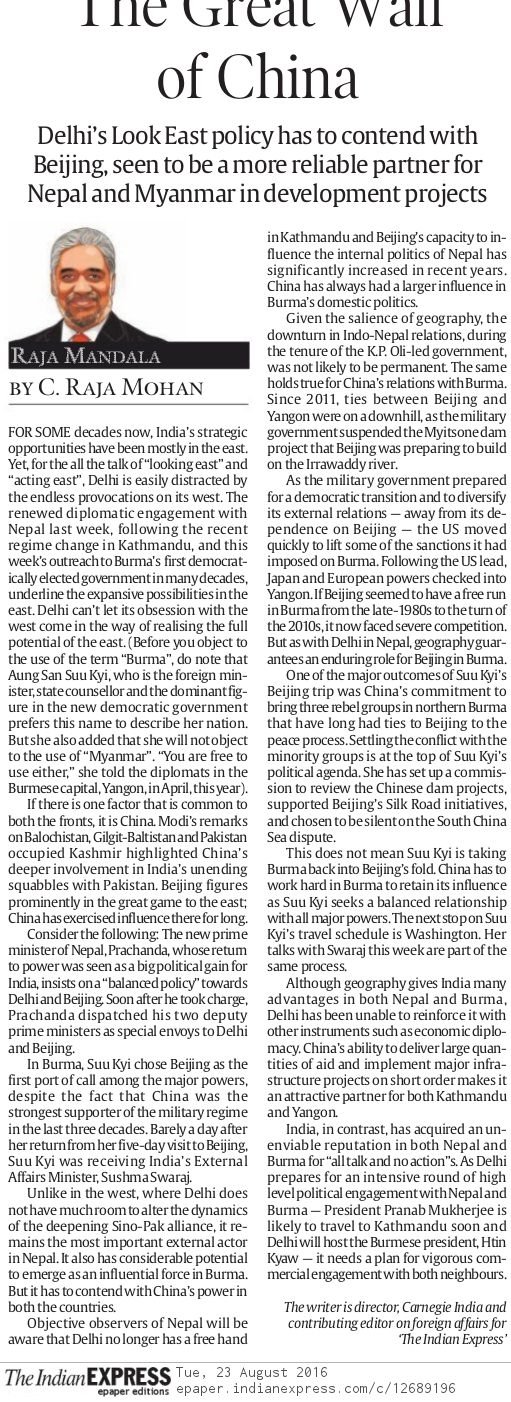
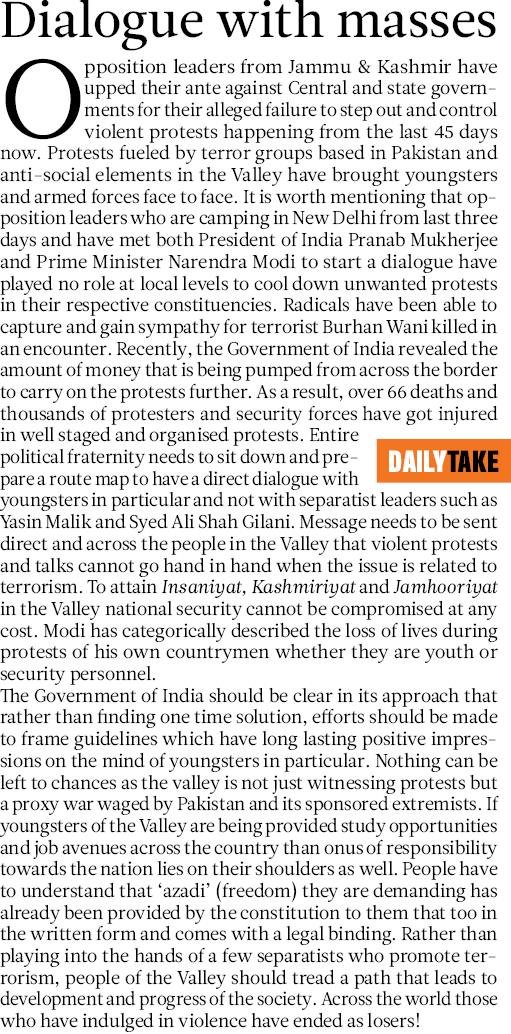
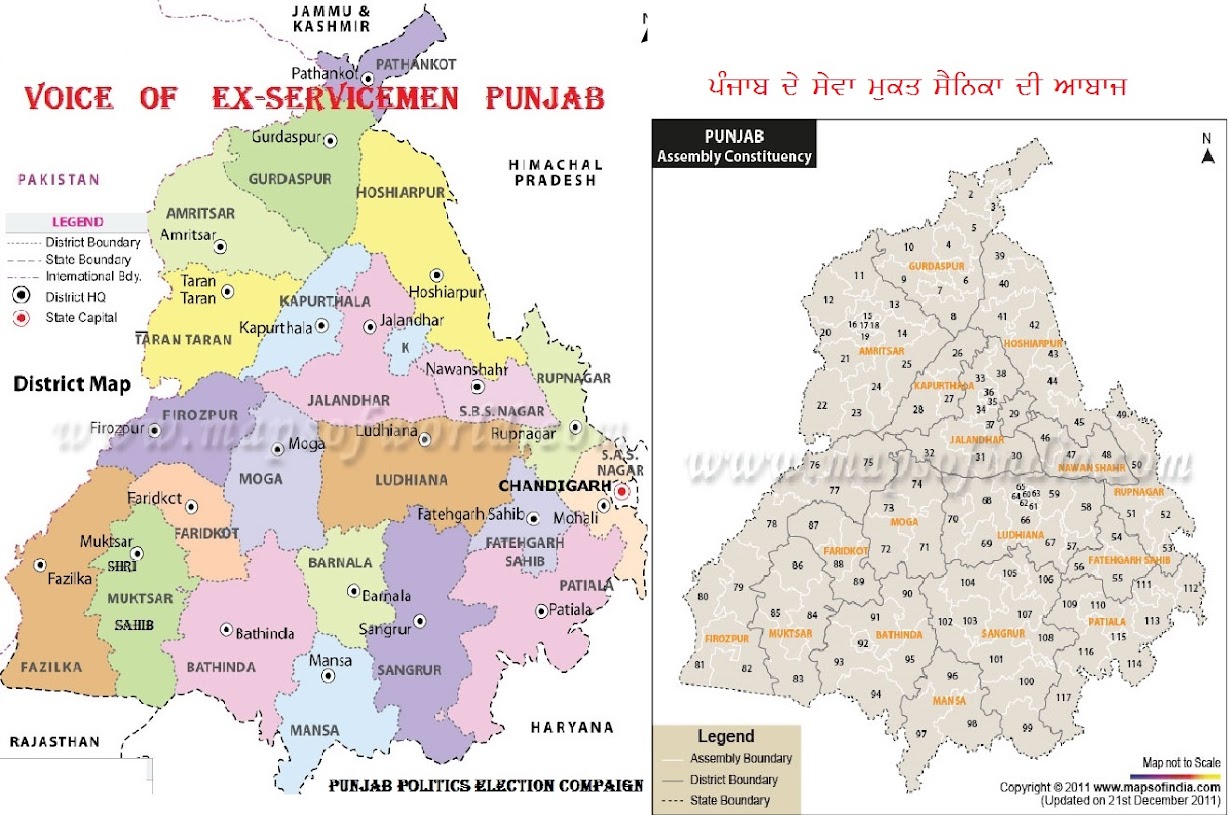
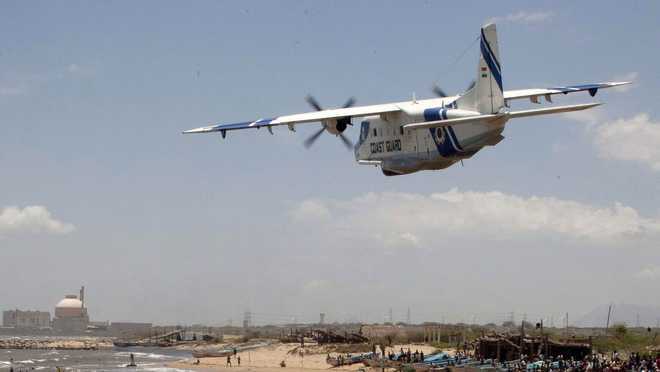




























































Top Comment
I am slowly but surely becoming fan of this defense minister who i didn”t like before. Yes i agree with him about army not using lathi. Keep up the good job defense minister. This is the first minis… Read MoreSunder AswaniThe issue has come to the fore because of a recent judgment about the Northeast+ , he said, referring to the Supreme Court lashing out over the long deployment of the armed forces and the imposition of the Armed Forces Special Powers Act (AFSPA), which seeks to grants army personnel legal immunity for their actions, in Manipur.
“We can’t lose people. So, wherever the army is used, the powers will have to be there, otherwise don’t use the army. In fact, I will be very happy if we don’t use the army anywhere in the country, other than disaster management,” he said.